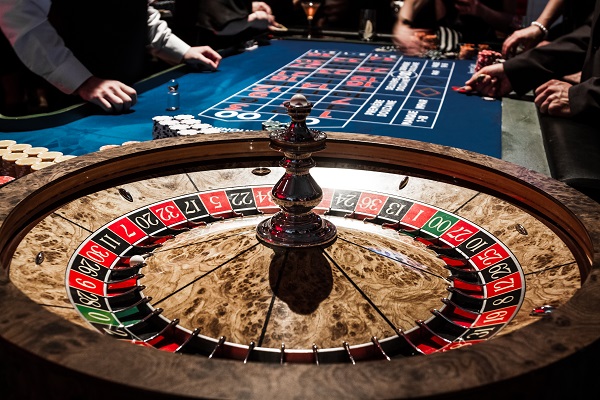
Step back in time to the days of powdered wigs and candlelit salons god55, where gentlemen and ladies gathered for a game of chance that would soon become a global sensation.
Picture yourself amidst the lavish surroundings of a French château, the clatter of ivory balls on a wooden wheel filling the air.
The origins of roulette are as intriguing as the game itself, steeped in history and mystery.
From its ancient beginnings to its arrival in America, the story of roulette unfolds like a captivating tale, leaving you hungry to uncover the secrets that lie within its spinning wheel.
Ancient Origins
The origins of roulette can be traced back to ancient civilizations, where early forms of the game were played using various methods of chance and prediction. The game's origins can be traced to China, where a similar game called 'baige piao' was played as early as the 9th century. This game involved players betting on numbered squares that were drawn randomly from a bag.
Over time, this game spread to Europe through trade routes and cultural exchanges. It gained popularity in France during the 18th century, where it underwent several modifications and became known as 'roulette' – meaning 'little wheel' in French. The game's rules continued to evolve, but its core concept of placing bets on the outcome of a spinning wheel has remained unchanged throughout history.
Early Variations
Early variations of roulette emerged as the game god55 slot spread throughout Europe in the 18th century, captivating players with their unique twists on the original concept of placing bets on a spinning wheel. These variations appeared in different regions, each adding its own cultural significance and development timeline to the game.
In France, the game evolved into what's now known as European roulette, featuring a single zero pocket on the wheel. Meanwhile, in Germany, a variation called German roulette emerged, which included an extra double zero pocket. The development of these variations mirrored the diverse cultural landscapes of Europe, as the game adapted and evolved to suit the preferences of different regions.
These early variations laid the foundation for the future evolution of roulette, setting the stage for further innovations in the game.
Evolution of the Wheel
As the game of roulette continued to gain popularity across Europe, the evolution of the wheel became a critical aspect of its development.
The original roulette wheel consisted of alternating red and black numbered pockets, with a single green pocket for the house advantage. However, as the game spread throughout Europe, various evolutionary changes were made to the wheel.
In the 19th century, the French brothers Louis and François Blanc introduced the single-zero wheel, god55 casino which significantly reduced the house edge and increased the odds for players. This modification had a profound cultural significance, as it not only enhanced the gameplay but also made roulette more accessible and appealing to a wider audience.
The evolution of the wheel played a crucial role in shaping the modern version of roulette that's still widely enjoyed today.
French Influence
Influenced by the French, significant changes were made to the game of roulette that shaped its evolution and cultural significance.
The French Revolution, a period of political and social upheaval in France during the late 18th century, played a crucial role in transforming roulette into a popular casino game. The revolution brought about a shift in social dynamics, leading to the emergence of a new class of wealthy individuals who sought entertainment and leisure.
Roulette became a symbol of luxury and sophistication, attracting the elite to the casinos. The French influence on roulette can also be seen in the introduction of the single zero pocket on the wheel, which increased the odds in favor of the house.
These changes not only altered the gameplay but also contributed to the game's cultural significance, firmly establishing it as a symbol of elegance and fortune.
Popularity in Europe
The game of roulette quickly gained popularity throughout Europe, captivating players with its thrilling gameplay and aura of sophistication. Its cultural impact was significant, as it became a symbol of elegance and luxury in the European society of the time.
Roulette attracted both the aristocracy and the common people, enhancing its appeal and expanding its reach. The game's influence on the gambling industry was undeniable, as it sparked a wave of interest in casinos and gambling establishments across Europe. It led to the development of specialized roulette tables and the establishment of dedicated gambling houses.
The popularity of roulette also paved the way for the introduction of other casino games, creating a thriving gambling culture that continues to thrive to this day.
Arrival in America
Upon its arrival in America, roulette quickly captivated gamblers with its unique gameplay and allure of chance. As the game made its way across the Atlantic, it underwent several American adaptations to suit the tastes and preferences of the local gambling enthusiasts.
The most significant modification was the addition of an extra pocket, featuring a double zero, alongside the single zero pocket. This alteration increased the house edge and further intensified the excitement and suspense of the game.
Roulette's arrival in America had a profound impact on the gambling industry. It quickly became a staple in casinos and gambling establishments, attracting a wide range of players. Its popularity soared, and it became synonymous with the American gambling scene, firmly establishing itself as one of the most iconic and beloved casino games in the country.
Conclusion
In conclusion, the history of roulette is a captivating journey that spans centuries and continents. From its ancient origins to its evolution into the game we know today, roulette has been influenced by various cultures and societies. French influence played a significant role in shaping the modern version of the game, while its popularity in Europe and eventual arrival in America cemented its status as a timeless casino classic.
Understanding the fascinating origins of roulette adds depth and context to the enjoyment of this beloved game.

